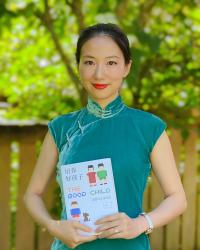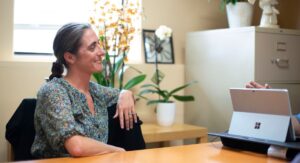CSDE is pleased to introduce five of our new UW Research Affiliates. Jade d’Alpoim Guedes (Assistant Professor, Anthropology, UW) is an environmental archaeologist and ethnobiologist who employs an interdisciplinary research program to understand how humans adapted their foraging practices and agricultural strategies to new environments and have developed resilience in the face of climatic and social change. Jing Xu (Affiliate Assistant Professor, Anthropology, UW) is an anthropologist and a developmental scientist, whose work uses interdisciplinary and mixed methods approaches to examine child development and family wellbeing in diverse populations and cultural contexts. Aditya Ramesh (Assistant Professor, History, UW) is a historian. His work revolves largely around environmental history, agrarian history, and the history of science, technology, and medicine in South Asia. Kavita Dattani (Assistant Professor, Gender, Women, & Sexuality Studies, UW) is a feminist researcher of digital technologies and data, whose work seeks to uncover the ways in which data-driven digital technologies are enabling new forms of violence and marginality and the potentials for more progressive data futures. Lesley Steinman (Research Scientist, Health Systems and Population Health, UW) has spent the past 20 years partnering with diverse stakeholders to conduct community-engaged research and practice to improve health promotion and disease prevention and management for populations facing inequities in access to quality care and health outcomes. Learn more about these new affiliates in the full story!

Jade d’Alpoim Guedes – Assistant Professor, Department of Anthropology, University of Washington. Jade d’Alpoim Guedes is an Assistant Professor in the Department of Anthropology at the University of Washington. Dr. D’Alpoim Guedes is an environmental archaeologist and ethnobiologist who employs an interdisciplinary research program to understand how humans adapted their foraging practices and agricultural strategies to new environments and have developed resilience in the face of climatic and social change. She employs a variety of different methodologies in her research including archaeobotany, paleoclimate reconstruction and computational modeling. Dr. d’Alpoim Guedes’ primary region of focus is Asia, where she has worked extensively in China, but also has interests in Nepal, Thailand and Pakistan. Dr. d’Alpoim Guedes also works closely with crop scientists to examine the potential of landraces of traditional crops such as millet, wheat, barley and buckwheat for modern agricultural systems.

Jing Xu – Affiliate Assistant Professor, Department of Anthropology, University of Washington. Jing Xu is currently an Affiliate Assistant Professor at the Department of Anthropology at the University of Washington and a Wenner-Gren Foundation Hunt Postdoctoral Fellow. She received her Ph.D. in anthropology from Washington University in St. Louis and completed postdoctoral work in developmental psychology at the University of Washington. Her work uses interdisciplinary and mixed methods approaches to examine child development and family wellbeing in diverse populations and cultural contexts. As an anthropologist and a developmental scientist, her research covers various lifestages and populations spanning multiple geographic regions and historical periods, i.e., contemporary China, America and Europe, Cold-War era Taiwan. Her latest project is relevant to migration studies, examining differences in developmental patterns across migrant and non-migrant families in three countries (The Republic of Congo, the U.S., and the UK).

Aditya Ramesh – Assistant Professor, Department of History, University of Washington. Aditya Ramesh joined the UW History Department in Winter 2024, from the University of Manchester, where he was a Presidential fellow in Environmental History. Previously, he was a postdoctoral fellow at the Center for the History of Science, Technology, and Medicine at the University of Manchester. His work revolves largely around environmental history, agrarian history, and the history of science, technology, and medicine in South Asia.

Kavita Dattani – Assistant Professor, Department of Gender, Women, & Sexuality Studies, University of Washington. Kavita Dattani is a feminist researcher of digital technologies and data. She received her PhD in Human Geography from Queen Mary University of London in 2022. Broadly, Kavita’s work seeks to uncover the ways in which data-driven digital technologies are enabling new forms of violence and marginality and the potentials for more progressive data futures. Kavita’s research has spanned different kinds of data-driven technologies: Biometric and Financial Technologies, Digital Dating Apps, and Digital Labour Platforms.

Lesley Steinman – Research Scientist, Department of Health Systems and Population Health, University of Washington. Lesley Steinman is a Research Scientist in the UW School of Public Health’s (SPH) Department of Health Systems and Population Health, based at a community-academic CDC-funded Prevention Research Center. For the past 20 years, she has partnered with diverse stakeholders (community members, practitioners, organizations, policymakers) to conduct community-engaged research and practice to improve health promotion and disease prevention and management for populations facing inequities in access to quality care and health outcomes. Much of this collaborative work has focused on disseminating, adapting, implementing, scaling, and sustaining the PEARLS program, a home/community-based collaborative care model that builds capacity among front-line social service providers to improve depression care access and outcomes among historically marginalized older adults, including low-income older communities of color, linguistically diverse communities, and rural communities. Lesley brings a range of community-engaged D&I research and practice methods; health equity, mental health, social connectedness subject matter expertise; and is an experienced trainer, partner, and practice coach translating research into practice.
These affiliates bring a wealth of knowledge and unique approaches that enhance our community of demographers and collectively advances population science. We look forward to supporting each of them as they pursue their research. You can learn more about their individual research interests by visiting their affiliate pages, linked above.
If you are interested in becoming an affiliate or you know of someone who should become one, you can invite them to do so by directing them to this page. Affiliate applications are reviewed quarterly, by CSDE’s Executive Committee.